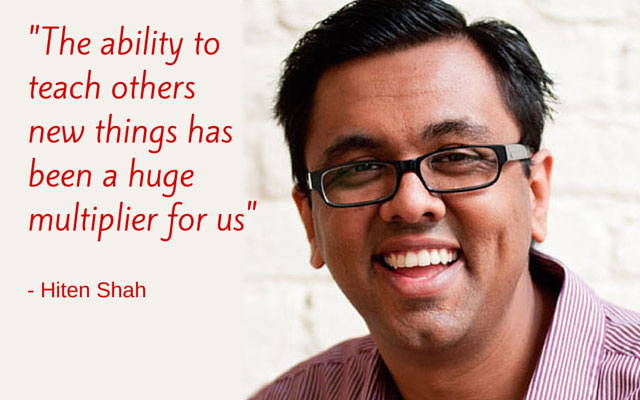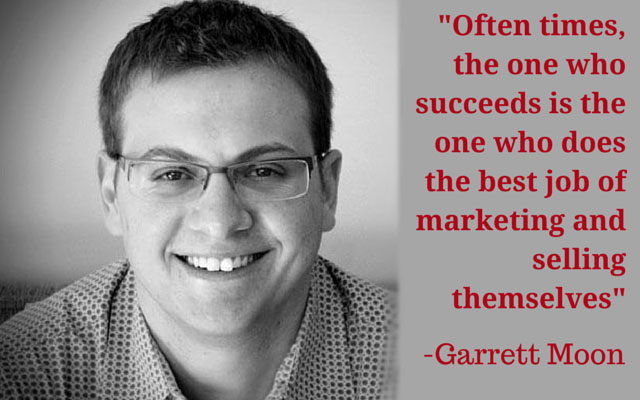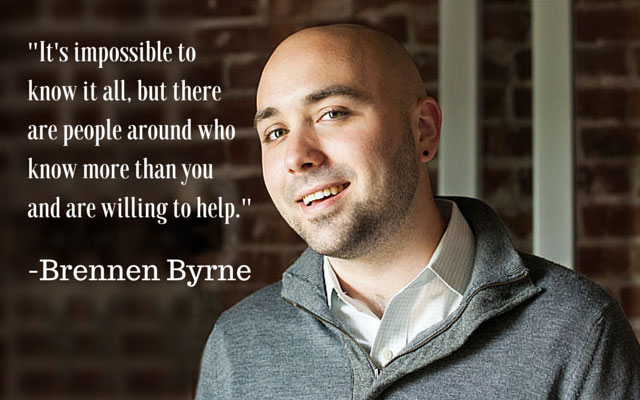For many entrepreneurs, focusing on one critical skill will lead to success in the early stages of their business. Finding that skill and focusing on it could mean the difference between success and failure. In this post, we hear from eight different entrepreneurs and learn about their one “critical skill.” I asked them the following questions:
- What was the one skill or activity you focused on that made your startup(s) successful?
- How did you know this was where you needed to focus?
- Did you need to sacrifice in other areas of your business to focus on your one skill?
What surprised me is that for most of them, focusing on this skill did not make them feel like they were sacrificing in other areas of their business. If you are focusing on the right thing, you won’t be sacrificing; you’ll be growing.
Hiten Shah: Cofounder – KISSmetrics

One big thing I’ve always valued is the ability to educate and teach people new things. With my last two startups we have used education to help with marketing, sales, customer support, and basically all areas of the business. We’d even have internal folks, such as our CTO, create videos to explain somewhat complicated concepts of how our backend infrastructure worked.
Our businesses have typically served any level of marketer, so we wanted to make sure we were able to teach them the most basic skills all the way to very advanced concepts. We also knew that content marketing was going to be a big part of our strategy considering that marketers are always eager to learn new things to help them do their jobs.
There are always things that you don’t end up doing because you lose focus. Our goal is to find things that are multipliers in our business, where one skill can be useful in many different areas of the business. The ability to teach others new things has been a huge multiplier for us.
Tim Conley: Founder – TimConley.co
The skill I focused on was how to sell.
I had a startup that didn’t get any customers, so I figured I should learn to sell since you can’t have a business unless someone buys something from you.
I don’t think sacrifice is the right word. Some things get a higher priority, but you can’t sell something that doesn’t ever exist, nor can you sell something you can’t deliver and still have a business.
A business is an amalgamation of many systems. If you don’t have these systems your business will soon collapse or never get going. You might have to emphasize specific systems at different points in your growth, but they all need to be built and maintained for the whole to work properly.
Jimmy Hayes: Cofounder – Minaal
The main ‘activity’ I focused on was surrounding myself with people way smarter and more experienced than I was and asking just the right amount of questions. Enough questions to assemble the knowledge required to build something, but not so many that I realized how completely ridiculous the project was. Without the generosity and patience of those people, I’d still be driving an ice cream truck (true story).
It might’ve been when my co-founder Doug and I decided to start a physical product company with no industrial or product design background, or when we flew to Asia and started door-knocking bemused manufacturing facilities, or during a boardroom meeting in the pre-production phase, when I was “subtly” Googling the questions they were throwing from the other side of the table. Short answer, it was clear from the very beginning that what we were taking on was beyond our immediate skill sets – that’s a major part of what made it so exciting.
Surrounding myself with the right people never felt like a sacrifice – like I said, without the help of others we wouldn’t be where we are now. And when I sit here and try to imagine what would’ve happened if we’d tried to do it completely alone… well, that jingle of the ice cream truck starts ringing in my ears all over again. Flashbacks are hell, man.
John McIntyre: Founder – The McMethod
Copywriting (ultimately just part of the general skill of sales and marketing).
A new business lives or dies based on its ability to get customers. I knew that if I could sell successfully, in person or online, I’d always have a source of income. If I honed my mastery of sales and marketing, whether practicing copywriting, developing systems for understanding a target market, or practicing sales call strategies, I’d build a solid foundation on which to further accelerate my career and business.
I also knew that sales and marketing isn’t niche specific. If you get good at sales and marketing, you can apply everything you know in any market – supplements, software, banking, gardening, publishing, and anything else. The applications are endless. And that meant that the skills I was developing would be useful in the years and decades to come, in as many different businesses as I tried to build.
Finally, I knew that most people aren’t willing to invest the time and effort to become true masters of anything, including sales and marketing. That meant that if I was willing to wake up early and write sales copy or do back-to-back calls with prospects or painstakingly review market research, and so step-by-step get better and better at marketing, I would gain a huge advantage over my competitors.
I never felt like I was sacrificing in other areas to build these skills.
A word of warning though:
I’ve sometimes made the mistake of overstating the importance of sales and marketing to the detriment of product quality. At the end of the day, you have to solve a real problem for your customers. You can’t sell hot air (well… you can, but you won’t be in business for long). Get good at sales and marketing, but don’t forget to build a product that genuinely helps people.
Garrett Moon: Founder – CoSchedule
I focused on sales and marketing. Very often, new entrepreneurs look to the product and problem they are solving before putting together the business side of things. Early on, we worked on learning as much as we could about the customers that we would be selling to through surveys and 1-on-1 interviews. This helped us reach them quickly with our marketing – even before we launched. It also helped us build a great product that our customers actually wanted!
I was involved in a previous startup that ultimately failed because we missed this step. We thought that we could build a successful product by simply creating something that was slightly better than what our competitors made. This was a rookie mistake. Often times, the one who succeeds is the one who does the best job of marketing and selling themselves. It can beat product, although I still recommend offering the best product that you can muster.
I don’t think I sacrificed by focusing on sales and marketing. Ultimately, this focus helped us build a better product. It also helped us launch with something that we could sell. We’ve always had a paywall at CoSchedule, and as an entrepreneur, I am proud of that. It’s good business.
Dan Norris: Cofounder – WP Curve
I would say content marketing. I wrote around 150 posts for Informly, most of which we moved across to WP Curve. That gave us a good boost when we got started, and I continued creating that content as the business grew.
There was definitely a long time before any reward, so there were times I wasn’t 100% confident I was doing the right thing. But I enjoyed doing it, and I knew it was getting traction so I kept at it.
I’m not sure if I sacrificed other areas, perhaps advertising. I don’t know a lot about it and I’ve never really been able to make it work.
Brennen Byrne: Founder – Clef
Listening. Every day, I encounter brand new challenges in fields that I haven’t ever worked in or even considered. In a startup, everyone has to be involved in everything – marketing, sales, product… It’s impossible to know it all, but there are people around who know more than you and are willing to help. Listening to them and not getting caught up in my own ideas has been really critical to our success.
I know I needed to focus on listening because I very quickly realized how out of depth I was on certain questions. I could fake some things, but when it came to fundraising or hiring or some of the other really delicate areas, I was in so far over my head that it was obvious I needed help and guidance. After that, it was easy to see that I could use that same help anywhere that I could find it.
I think there’s a balance between confidence and humility that every entrepreneur has to strike and there are definitely trade-offs between the two. Seeming unsure or insecure can make it really hard to lead effectively, so this can definitely be taken too far. The tricky part about focusing on listening is that it can’t slow you down or make you doubt yourself.
Scott Paul: Founder – ArmorActive
I focused on a vision of what I wanted the customer experience to look like. I look back and realize that my time is best spent if I stay extremely focused on how people will interact with my product.
Before you can ship anything, you have to focus on creating the product, so I didn’t have to think hard about it. Once it’s made, you get to do lots of customer interviews and watch sales and marketing to dictate the next focus.
I had to sacrifice my desire to do other pet projects and also sacrifice ego. You don’t get to network and be cool and vacation or be CEO when you are starting something. You are the minion of your own company and you have to do everything that larger companies would have interns or new hires doing.
You know you’re doing something right when you are so in the weeds, you are the one answering every email, making every marketing message. This will be represented in a product or service that you understand completely. Your business will have your blood and sweat in it. People can feel the authenticity and the passion when they work with you and they appreciate it.
Conclusion
These founders all have very different business models, such as SaaS, physical goods and consulting. But there is an interesting trend in how similar these stories are to each other. It seems to boil down to one of three things: surrounding yourself with the right people, creating something great and selling it. It’s worth taking the time to see what one thing you could focus on.
As you can see from each of these stories, when you’re focused on the right aspects of your business and cut out the rest it does not feel like a sacrifice. It feels like growth.
For further reading I recommend checking out “The ONE Thing” by Gary Keller. It goes deeper into the power of simplicity and focus when creating a business, or doing anything great.
About the Author
Kyle Gray is the content marketing manager for WP Curve. In the past, Kyle directed a Startup Accelerator called the Foundry in Salt Lake City, and loves helping other’s start and grow their businesses.
Find this article helpful?
This is just a small sample! Register to unlock our in-depth courses, hundreds of video courses, and a library of playbooks and articles to grow your startup fast. Let us Let us show you!
Submission confirms agreement to our Terms of Service and Privacy Policy.






